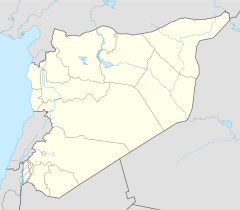 Satellite view | |
| Location | Saidnaya, Rif Dimashq Governorate, Syria |
|---|---|
| Coordinates | 33°39′54″N 36°19′43″E / 33.66500°N 36.32861°E |
| Status | Disputed |
Sednaya Prison (Arabic: سجن صيدنايا Sajn Ṣaydnāyā), nicknamed the "Human Slaughterhouse"[a] is a military prison near Damascus in Syria operated by the Syrian government. The prison has been used to hold thousands of prisoners, both civilian detainees and anti-government rebels.[1][2] The Syrian Observatory for Human Rights (SOHR) estimated in January 2021 that 30,000 detainees have perished in Sednaya from torture, ill-treatment and mass executions since the outbreak of the Syrian Civil War,[3] while Amnesty International estimated in February 2017 "that between 5,000 and 13,000 people were extrajudicially executed at Saydnaya between September 2011 and December 2015."[4]
Overall, human rights organizations have identified over 27 prisons and detention centers run by Assad's regime around the country where detainees are routinely tortured and killed. A defector from Assad's sources smuggled out tens of thousands of photographs from these prisons, showing the bodies of those who had been murdered. The defector stated that he had personally photographed the dead and that archives of thousand more such photographs of other victims existed.[5]
A former inmate of the prison who was detained for participating in a peaceful non-violent protest told Amnesty International that at Sednaya prisoners were forced to choose between dying themselves or killing one of their own relatives or friends. The former inmate also stated that in the first prison he was at, prisoners were also forced into cannibalism, but that prison was "heaven" compared to Sednaya Prison. According to the inmate, the other prison (Branch 215) was "to interrogate" (including through torture), but when that was done, you were moved to Sednaya "to die".[6]
Wide variety of inhumane torture practices are carried out in the prison; ranging from perpetual beatings, sexual assaults, decapitations, rapes, burnings to what are known as the "flying carpets".[7] In 2017, the US State Department alleged that a crematorium had been built at the prison to dispose of the bodies of the executed, although Amnesty's investigation did not find evidence of this having happened.
Cite error: There are <ref group=lower-alpha> tags or {{efn}} templates on this page, but the references will not show without a {{reflist|group=lower-alpha}} template or {{notelist}} template (see the help page).
- ^ Broomfield, Matt (2016-05-05). "Prisoners riot over claims President Assad is about to start torturing and executing them". The Independent. Retrieved 2017-05-15.
- ^ Washington Post, December 2018 syria bodies
- ^ "Torture victims | Civilian from Daraa dies in Sednaya prison". 9 January 2021. Retrieved 11 January 2021.
- ^ Editorial Board (February 11, 2017). "A 'human slaughterhouse' in Syria". The Washington Post.
- ^ Houry, Nadim (16 December 2015). "If the Dead Could Speak". Human Rights Watch. Retrieved 11 July 2017.
- ^ "Former Detainee Describes Atrocities Inside Syrian Prison". www.wbur.org. Retrieved 11 July 2017.
- ^ "End the Horror in Syria's Prisons". Amnesty International. 2016. Archived from the original on 9 September 2016.
